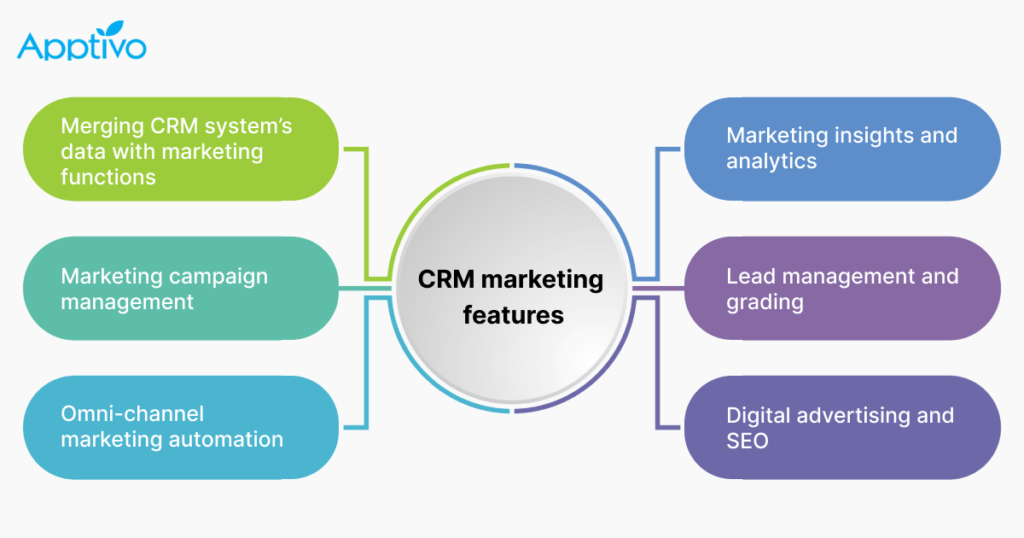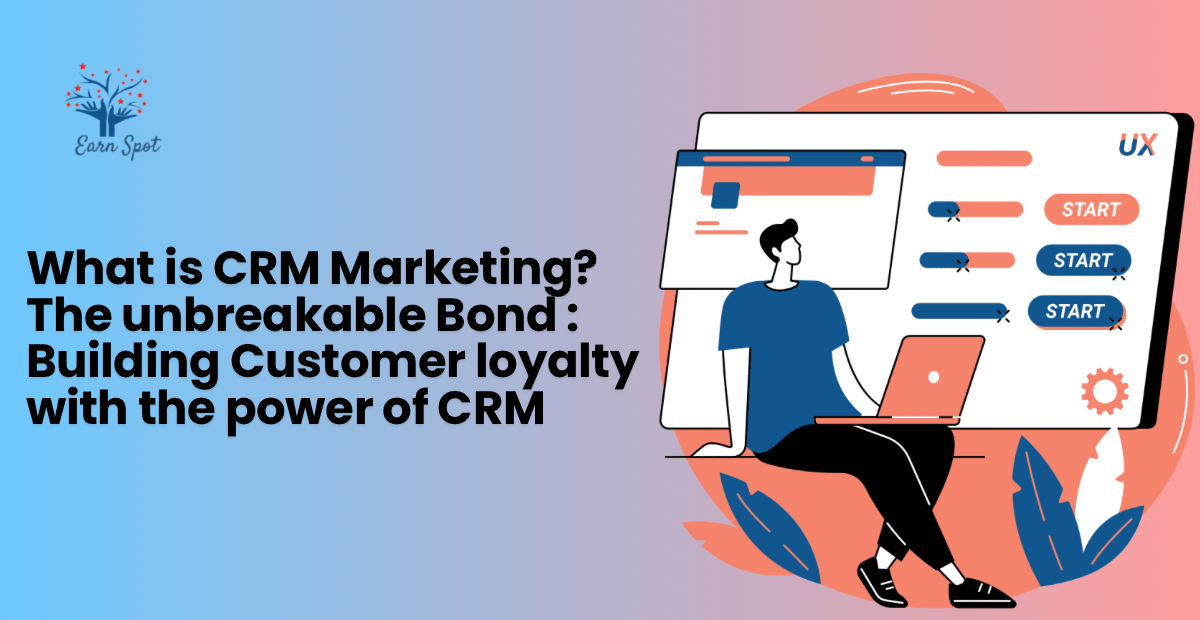Table of Contents
CRM marketing is a process that involves the use of specialized software to track customer interactions across various channels, including email, social media, websites, and in-person interactions. This software allows businesses to create personalized marketing campaigns, offer better customer service, and ultimately build stronger and more profitable relationships with their customers.
CRM is like a personal directory for your business, allowing you to manage all your customer data in one place.
- Send your customers highly personalized messages and offers, as if you were their best friend.
- Guide them through the purchasing process, step by step.
- Provide exceptional customer service, making them feel heard and understood.
- Analyze your marketing strategies to determine which are most effective, like a coach reviewing a game plan.
How CRM helps in Marketing
It stores customers’ personal information including their names, emails, purchase history, and even preferred snacks, making it a valuable tool for personalized service.
1.It helps you guide them through the buying process:
CRM platforms use lead-scoring algorithms to help you identify high-quality leads with greater purchase intent. This is done by analyzing various factors such as website activity, email engagement, and downloaded content. By prioritizing your sales efforts on these high-quality leads, you can increase your chances of closing a deal.
CRM data powers dynamic content delivery, customizing website experiences and product recommendations based on individual preferences and browsing history. This creates a frictionless journey where potential customers encounter products and information most relevant to their needs.
2.”It helps you save time and work smarter “:
It can automate tasks such as sending emails and posting on social media. This way, you can focus on the more enjoyable aspects of your work, such as generating new ideas. It’s like having a robot assistant that takes care of the tedious chores for you!
3.It helps you keep track of what’s working:
CRM marketing provides real-time insights into the performance of your marketing campaigns across various channels like email, social media, and website traffic. This includes metrics such as open rates, click-through rates, conversion rates, and engagement levels
Identifying touchpoints that move leads through the sales funnel and attributing revenue to specific campaigns can be done by tracing customer journeys in the CRM.
Advanced CRM platforms can help you predict future trends and optimize your campaigns using data-driven insights. These platforms use predictive analytics, which analyze data to provide insights that can help you make better decisions. By using these insights, you can create targeted campaigns that are more likely to be successful. With advanced CRM platforms, you can streamline your marketing efforts and improve your business performance.
If you want to improve your marketing ROI and gain valuable insights for future campaigns, it’s important to fully understand your customers’ journey through CRM. To achieve this, it’s necessary to use clear, direct and concise language that is easily understandable by your target audience.
You should organize your text logically, starting with the most important information first, and use short sentences that only include necessary information. Avoid using complex vocabulary, acronyms, jargon, or legal language, and opt for everyday language instead. Use the active voice and verb forms to keep the text simple and clear.

4.It helps you send them super-personalized messages:
CRM collects data on customer interactions, preferences, and purchase history to create targeted groups based on specific characteristics and behaviors. This helps to better understand your customers and their needs, allowing you to tailor your approach for maximum impact.
Customer Relationship Management (CRM) allows you to automate communications based on specific customer actions or milestones. This means you can send things like birthday greetings, abandoned cart reminders, or follow-up emails triggered by website visits. These automated communications create opportunities for personalized engagement and help guide customers through the sales funnel. By using CRM, you can tailor your messaging to meet the unique needs of each individual customer.
Sinking Further: Specific Features and Applications of CRM in Marketing
CRM Lead Prioritization and Scoring
Imagine having to sift through a huge pile of sand, searching for precious diamonds. That’s what it often feels like to manage leads using traditional methods. But CRM stands out in this scenario with lead scoring and prioritization, which are powerful tools that can help you discover the high-potential leads hidden within your data.
CRM analyzes various factors such as website activity, email engagement, downloads, and demographics to assign predictive scores to each lead. These scores indicate the likelihood of the lead converting into a paying customer. This intelligent sorting enables you to concentrate on the most promising leads, referred to as “diamonds”, and increase the chances of successfully converting them into paying customers.
“Stop wasting your time on low-quality leads. Prioritization will become effortless with our solution. You can guide your sales team towards the most promising leads, thus achieving higher conversion rates and shorter sales cycles. Also, you can create customized nurturing campaigns for leads with lower scores, gradually encouraging them to make a purchase decision.”
Automation in Personalized Marketing:
CRM (Customer Relationship Management) is a data-driven approach that helps businesses analyze past interactions, preferences, and purchase history of each customer. This helps in crafting campaigns that are specifically targeted to meet the unique needs of each customer.
It’s not just about sending emails; it’s about sending the right email, at the right time, with the right message. To take it further, trigger-based automation can be used to prompt personalized follow-ups after website visits, abandoned carts, or downloaded content.
The benefits are manifold: higher engagement, deeper customer connections, streamlined workflows, and data-driven insights to constantly refine your strategy. Personalized Marketing Automation turns your marketing efforts into a conversation, building long-term loyalty and boosting your bottom line. So, step away from the generic blasts and embrace the power of one-to-one communication with CRM. Let the dance of personalized marketing begin!

“Here is an overview of how Customer Relationship Management (CRM) can revolutionize marketing strategies in various industries:”
- B2B Marketing:
- CRM helps to manage long-term relationships with diverse decision-makers across organizations, making it easier to communicate with them personally and follow up in a targeted manner.
- Account-based marketing (ABM) involves identifying and prioritizing high-value accounts, tailoring content and offers based on their specific needs, and tracking engagement across departments.
2. E-commerce Marketing:
- CRM analyzes customers’ purchase history, browsing behavior, and past interactions to provide personalized product recommendations, thereby increasing conversions and average order value.
- Loyalty programs and customer retention are fostered by CRM. It tracks customer activity, rewards purchases, and offers exclusive deals based on individual preferences.
3.Healthcare:
- Manage patient relationships by tracking appointments, medical history, and treatment plans to ensure personalized care and efficient communication.
- Health awareness campaigns can be more effective by targeting patient groups based on demographics and health conditions. Relevant educational content can be delivered to these groups while promoting preventative measures.
- Appointment scheduling and reminders: Automate appointment confirmations and follow-up messages, reducing missed appointments and improving patient satisfaction.
CONCLUSION:
In conclusion, CRM is not just software; it empowers you to move beyond generic campaigns and one-size-fits-all approaches. With CRM, you can transform customer interactions into personalized experiences that ignite engagement and drive success.
CRM helps you move from mass marketing to meaningful partnerships, where each customer feels appreciated and understood. It does this by providing you with data drive insights to continuously modify your plans ,measure results, and maximize your marketing speed

